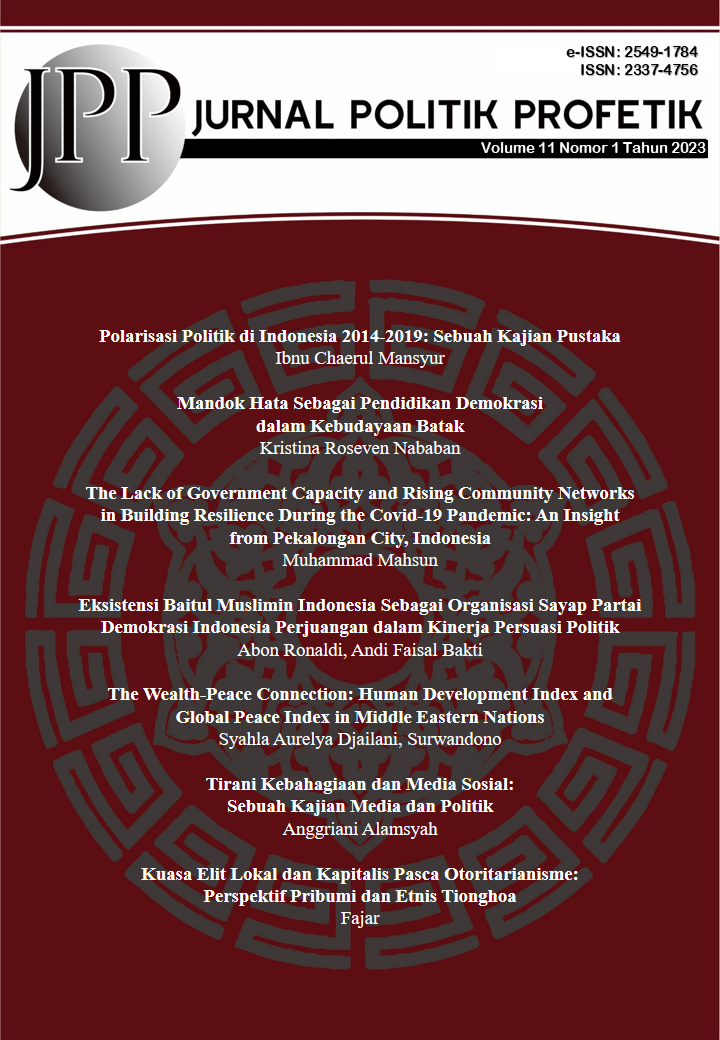Mandok Hata Sebagai Pendidikan Demokrasi dalam Kebudayaan Batak
Abstrak
Democracy education in Indonesia tends to be based on the national curriculum which often does not consider local values and socio-cultural contexts. This article aims to analyze local wisdom-based democratic education, with a focus on mandok hata as a model of local wisdom practice. This study used a qualitative method with primary data collection techniques through interviews and observation of 5 research subjects who were key informants, as well as secondary data through literature studies. The results of the study show that mandok hata contains the principles of democratic education, including active involvement and participation, understanding of rights and obligations, criticism and reflection, practical communication, ability to work together and mutual cooperation, and social awareness. An approach to democratic education that integrates the values and traditions of mandok hata can help develop individual participation and political awareness within families and local communities. Thus, local wisdom-based democratic education has an important role in forming a democratic and participatory society, as well as in strengthening and preserving local wisdom as a valuable cultural heritage.
##plugins.generic.usageStats.downloads##
Referensi
Arifin, N. (2020). Pemikiran Pendidikan John Dewey. JAs-Syar’i: Jurnal Bimbingan & Konseling Keluarga, 2(2), 168–183.
Barrett, M., & Brunton-Smith, I. (2014). Political and Civic Engagement and Participation: Towards an Integrative Perspective. Journal of Civil Society, 10(1), 5–28.
Bashori, K. (2018). Pendidikan Politik di Era Disrupsi. Sukma: Jurnal Pendidikan, 2(2), 287–310.
Damayanti, C. (2021). Peran Imajinasi Dalam Merawat Kemanusiaan: Sebuah Kajian Pemikiran Martha Nussbaum Dalam Mereformasi Pendidikan. Driyarkara School of Philosophy.
Gordon, M., & English, A. R. (2016). John Dewey’s Democracy and Education in an Era of Globalization. Educational Philosophy and Theory, 48(10), 977–980.
Husni, M. (2020). Memahami Pemikiran Karya Paulo Freire “Pendidikan Kaum Tertindas.” Al-Ibrah, 5(2), 41–60.
Hutagaol, S. D. P. (2019). Pemahaman Jemaat HKBP Dame terhadap Mandok Hata. Universitas Kristen Satya Wacana Salatiga.
Miles, M. B., Huberman, A. M., & Saldaña, J. (2014). Qualitative data analysis: An expanded sourcebook.
Muharrami, U. (2021). Sarcasm Identification of Batak Toba Culture in the Mandok Hata New Year Celebration. AICLL Annual International Conference on Language and Literature (AICLL), 2021, 647–655.
Nababan, K. R. (2022a). Hasil wawancara dengan AS (21 tahun).
Nababan, K. R. (2022b). Hasil wawancara dengan M (19 tahun).
Nababan, K. R. (2022c). Hasil wawancara dengan MN (54 tahun).
Nababan, K. R. (2022d). Hasil wawancara dengan PN (63 tahun).
Nababan, K. R. (2022e). Hasil wawancara dengan SS (62 tahun).
Natalia, S. F., & Aditya, M. F. (2019). Dampak Perang Batak pada Tahun 1878-1907 Terhadap Penyebaran Agama Kristen di Sumatera Utara. Tsaqofah, 17(1), 42–48.
Panggabean, J. Z. Z. (2022). Pendidikan Kristiani Berbasis Berpikir Kritis: Sebuah Tawaran Model Pembelajaran Demokratis Berdasarkan Pemikiran Pendidikan Membebaskan Menurut Paulo Freire. Harati: Jurnal Pendidikan Kristen, 2(2), 127–145.
Pennington, M. (2014). Against democratic education. Social Philosophy and Policy, 31(1), 1–35.
Priyono, C. D., & Siregar., I. (2021). Degradasi Nilai-Nilai Kearifan Lokal Dalihan Na Tolu Pada Remaja Di Kota Padangsidimpuan. Jurnal Education and Development, 9(4), 346–353.
Simaremare, F., & Meisuri. (2021). Deixis On Mandok Hata In Saur Matua Death Ceremony. TRANSFORM : Journal of English Language Teaching and Learning of FBS, 10(3).
Situmorang, T. L., Rajagukguk, F. H., & Darwin. (2022). Kepemimpinan Berbasis Dalihan Na Tolu Dalam Sekolah Penggerak : Sebuah Kajian Deskritif. Jurnal Education and Development, 10(2), 567–573.
Thornton, S. J. (2018). Nel Noddings as Social (Studies) Educator. Theory Into Practice, 57(4), 263–269.
Yusuf, M. (2017). Metode Penelitian Kuantitatif, Kualitatif, dan Penelitian Gabungan. Kencana.
##submission.copyrightStatement##
##submission.license.cc.by-nc-sa4.footer##














